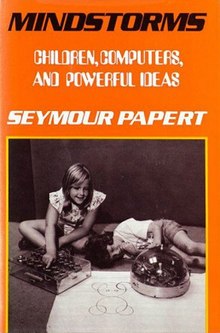 First edition | |
| Author | Seymour Papert |
|---|---|
| Language | English |
| Series | Harvester Studies in Cognitive Science |
Release number | 14 |
| Subject | Computer literacy |
| Published | 1980 (Harvester Press) |
| Publication place | United Kingdom |
| Media type | |
| Pages | 238 |
| ISBN | 978-0-85527-163-3 |
| OCLC | 83827854 |
Mindstorms: Children, Computers, and Powerful Ideas is a book by computer scientist Seymour Papert, in which he argues for the benefits of teaching computer literacy in primary and secondary education. [1] It was published by Basic Books in 1980, and republished in a new edition by Basic Books in 1993.
The Lego Mindstorms programmable construction set system is named after the book. [2]
In 2017, thanks to Papert's family, the book was made freely available online here.
Papert describes the Turtle as an "object-to-think-with" and discusses many code examples of Turtle Graphics.
References
- ^ "Mindstorms". BasicBooks.com. Basic Books.
- ^ Bumgardner, Jim (March 2007). "The Origins of Mindstorms". Wired.
 First edition | |
| Author | Seymour Papert |
|---|---|
| Language | English |
| Series | Harvester Studies in Cognitive Science |
Release number | 14 |
| Subject | Computer literacy |
| Published | 1980 (Harvester Press) |
| Publication place | United Kingdom |
| Media type | |
| Pages | 238 |
| ISBN | 978-0-85527-163-3 |
| OCLC | 83827854 |
Mindstorms: Children, Computers, and Powerful Ideas is a book by computer scientist Seymour Papert, in which he argues for the benefits of teaching computer literacy in primary and secondary education. [1] It was published by Basic Books in 1980, and republished in a new edition by Basic Books in 1993.
The Lego Mindstorms programmable construction set system is named after the book. [2]
In 2017, thanks to Papert's family, the book was made freely available online here.
Papert describes the Turtle as an "object-to-think-with" and discusses many code examples of Turtle Graphics.
References
- ^ "Mindstorms". BasicBooks.com. Basic Books.
- ^ Bumgardner, Jim (March 2007). "The Origins of Mindstorms". Wired.